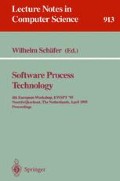Abstract
The conclusion I draw, with respect to the research agenda for the SP community, is that the emerging interest for the inter-operability of a set of independently developed modules should be cultivated, and will play an important tactical role, but should not be considered a strategic target, as should instead be that of identifying a core language (a few core languages, each) accompanied by several compatible sub-languages. The reason is that the experience with systems that interconnect independent modules will be an effective way to understand what is needed of each of them, as service providers, and what instead is there that should not, like hidden co-ordination policies and possibly incompatible redundancies. However, the quest for inter-operability alone reflects an optimistic laisser-faire attitude with respect to the evolution of PSEEs: let the individuals communicate and grow, and the community will also grow. I don't see any real evidence supporting this view. Also O&H show some doubts, when they state that “it will be interesting=8A to see whether interoperability difficulties appear and accelerates the drift [in the direction of increasingly different coding languages and platforms] continues”. Rather, I see some analogy between interoperability and construction with natural materials: in both cases the engineer has to cope post-hoc with mismatches that can be instead avoided using carefully designed artificial bricks and sub-languages, respectively. As a final note, there is at least one candidate as a basis for the core language, namely the emerging co-ordination theory [3].n
Preview
Unable to display preview. Download preview PDF.
References
Conradi, R., Liu, C.: Process Modelling Languages: one or many? In these Proceedings.
Montangero, C., Ambriola, V.: Oikos: constructing process-centred SDEs. In A. Finkelstein, J. Kramer and B. Nuseibeh (eds) Software Process Modelling and Technology, Research Study Press (Wiley), Taunton, 1994, 131–151.
Malone, T.W., Crowston, K.: The interdisciplinary study of Co-ordination. ACM Computing Surveys 26 (1994) 87–119.
Osterweil, L., Heimbigner, D.: An Alternative to Software Process Languages. In C. Ghezzi, editor, Proc. ISPW9, Airlie, Va, 1994.
Kadia, R.: Issues Encountered in Building a Flexible SDE — Lessons from the Arcadia Project. In Proc. ACM Sigsoft SDE5, 169–180, 1992.
Author information
Authors and Affiliations
Editor information
Rights and permissions
Copyright information
© 1995 Springer-Verlag Berlin Heidelberg
About this paper
Cite this paper
Montangero, C. (1995). In favour of a coherent process coding language. In: Schäfer, W. (eds) Software Process Technology. EWSPT 1995. Lecture Notes in Computer Science, vol 913. Springer, Berlin, Heidelberg. https://doi.org/10.1007/3-540-59205-9_46
Download citation
DOI: https://doi.org/10.1007/3-540-59205-9_46
Published:
Publisher Name: Springer, Berlin, Heidelberg
Print ISBN: 978-3-540-59205-1
Online ISBN: 978-3-540-49224-5
eBook Packages: Springer Book Archive

